Northern Ireland special report: Generalised Day of Action
Last month, public sector workers in Northern Ireland joined together in solidarity to protest the lack of pay, poor conditions, and the political deadlock that has blocked negotiations. Synergy reports from the marches
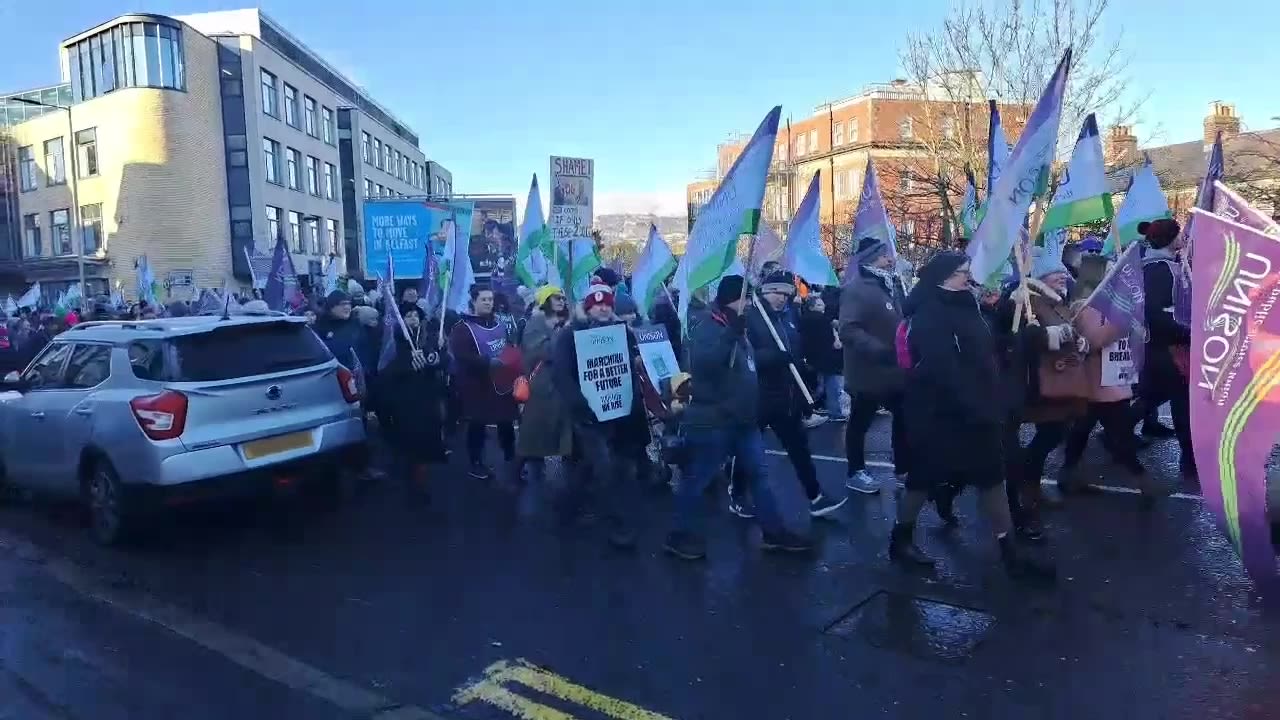
On 18 January, more than 150,000 public sector workers in Northern Ireland went on strike in the largest day of action for 50 years.
Marches were held across the country, as members of 16 trade unions held coordinated strike action across NI, bringing public services almost to a standstill.
Workers were protesting unsustainable working conditions in the public sector, including the pay disparity with the rest of the UK.
The Society of Radiographers was one of the first unions to announce it would be holding 12 hours of action, with more than 1,000 members in NI walking out over the challenges they face.
Synergy visited Belfast on the ‘Generalised Day of Action’, led by unions including Unison, Unite, GMB, and the Society of Radiographers, to see the strike first hand.
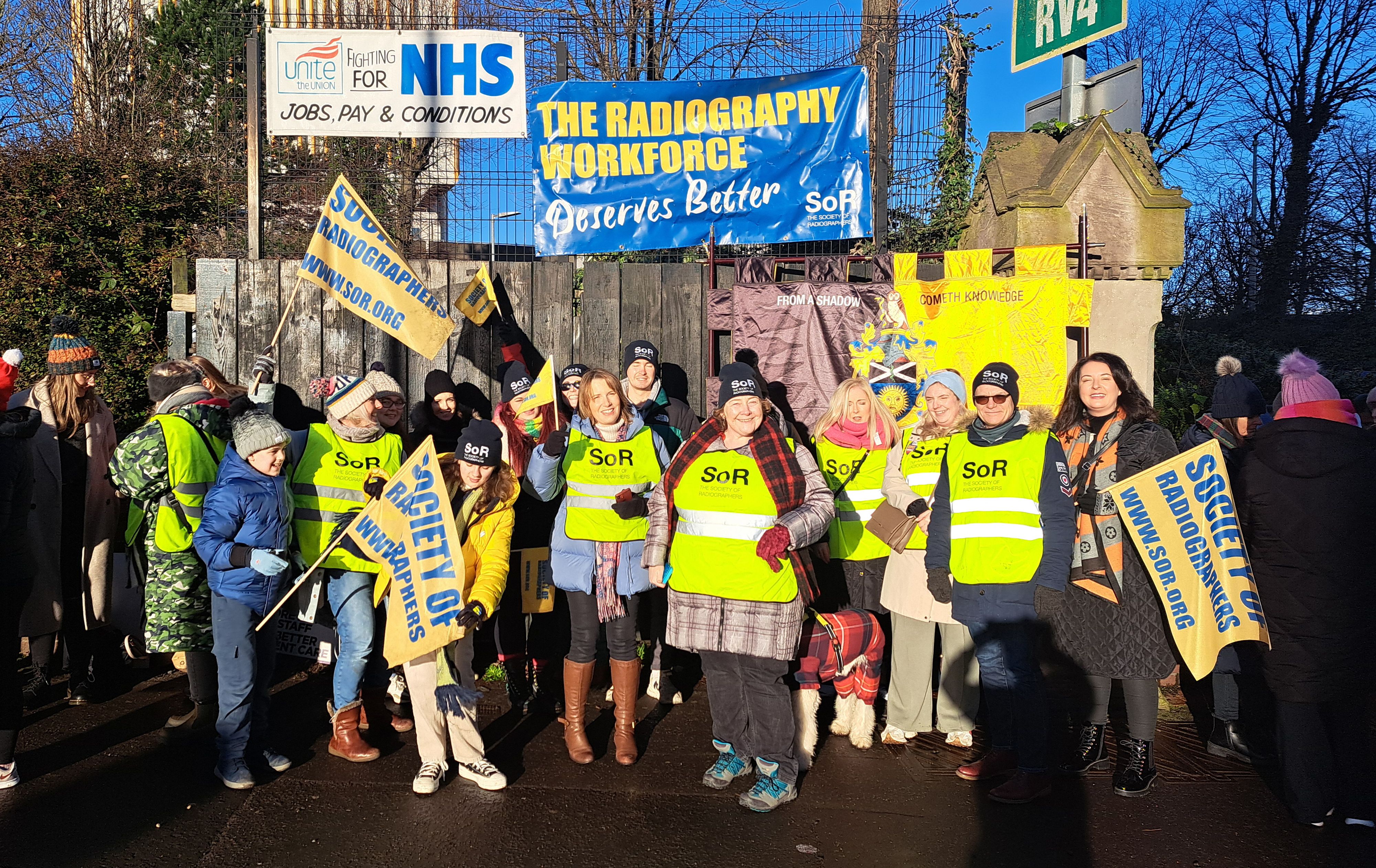
Political upheaval
Secretary of State for Northern Ireland, Chris Heaton-Harris MP, has refused to pay public servants a fair increase, arguing their salaries are a matter for the NI executive and the local civil service.
Most public sector workers have not received a pay rise in recent years, and with high inflation this means many have experienced real-terms pay cuts.
Employers have argued that there is no money to offer pay rises in the budgets set by the Northern Ireland secretary. Mr Heaton-Harris has been responsible for allocating budgets as there has been no devolved government in Northern Ireland since early 2022, when the power-sharing executive collapsed.
The devolved government collapsed before the 2022 Northern Ireland Assembly election, as the DUP withdrew its support over post-Brexit trade rules. (At the time of writing, the DUP has endorsed a deal to restore power sharing, paving the way for an end to the two-year political deadlock).
In response to the political and economic situation, tens of thousands of public sector workers, from radiographers to nurses, teachers, and civil servants, voted to strike.
On the day of the strike, union members gathered at hospitals and other sites across Belfast, Londonderry, Omagh, Enniskillen, Magherafelt, and Cookstown, in a rally organised by the Northern Ireland Committee, Irish Congress of Trade Unions (NIC-ICTU).
In Belfast, pickets were held at Belfast City Hospital, Royal Victoria Hospital and Mater Infirmorum Hospital, followed by a march through the streets to City Hall, where members listened to talks from union leaders, who expressed the importance of industrial action, the power of the unions, and the necessity of these strikes.
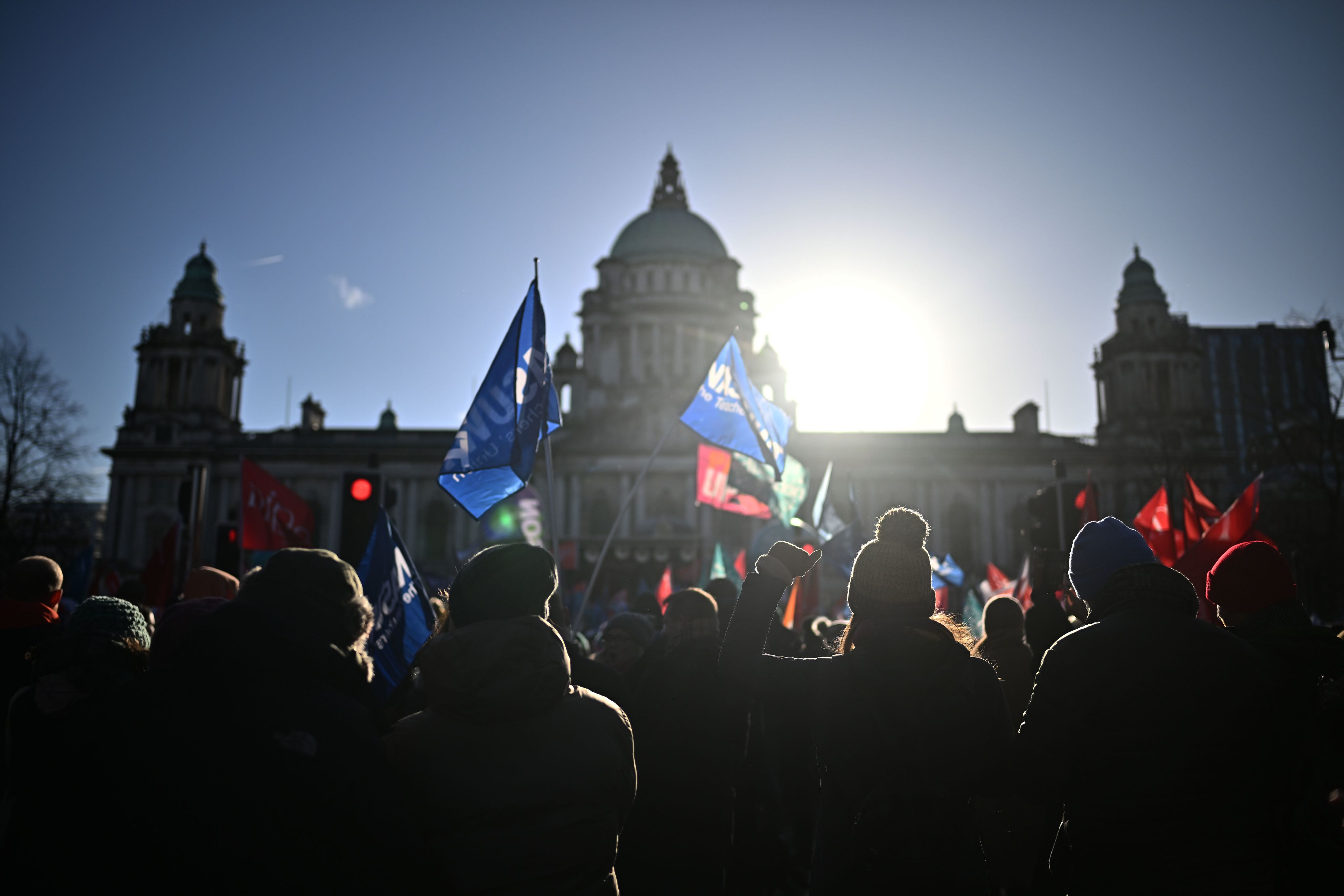
Pay disparity
Officers of the SoR attending the strike spoke to Synergy about the situation in Northern Ireland, where radiographers are the lowest paid in the UK. In Scotland, radiographers are now paid 12 per cent more than in Northern Ireland.
Dean Rogers, SoR’s executive director of industrial strategy, said: “Radiographers are the keystone of NHS provision. In Northern Ireland, radiographers earn less than they would earn in England, and significantly less than their competition in the Republic. They haven’t had a pay rise throughout the cost of living crisis. Inflation has soared, and they’re still waiting for last year’s pay rise, while we’re supposed to be negotiating this year’s.
“There’s no government willing to take leadership and responsibility and accountability for that. We’re hoping there is recognition that the politicians need to do their jobs, so that the health service and the public sector can do this properly.”
“The pay award in England wasn’t enough,” Dean added. “And the Northern Irish people are waiting for that as a very minimum. This is the start of a difficult year of pay negotiations. We’ve got a general election coming up across the whole of the UK. There are serious political choices to be made at the moment.
“This the start of a difficult year, and a difficult start for people having to take this action, but it’s the start of a positive year, where the politicians will start to listen and to make some better political choices.”
Dean added that people have been “incredibly frustrated and demoralised” for a long time, and that the opportunity to come together and make a stand is “definitely uplifting.”
“There’s definitely a positive mood. Everyone’s proud of where they’re from,” he added.
“They’re proud of what they do. They’re proud of the people they serve, and today, they’re really proud of themselves because they’re making a stand not just for themselves, but also for the patients and the people of Northern Ireland, who deserve so much better.”
Defiant attitude
The day of action was one of the largest industrial actions in Northern Ireland’s history, with more than 150,000 workers walking out in protest, including 1,335 members of the SoR.
The crowd made its way through the roads in high spirits, chanting throughout. Passing cars honked horns to show their support from the sidelines, as police blocked off the roads to allow the procession to continue.
Cora Regan, SoR’s national officer for Northern Ireland, said: “Our members are standing on picket lines in freezing, sub-zero temperatures here today, but the mood is very upbeat. What we do have here in Northern Ireland is positivity and hope. We hope that the action we’re taking today will make the public and the politicians stand up and listen, because the alternative to not listening to what’s going on today is massive future disruption, and real risk to public services right across Northern Ireland.”
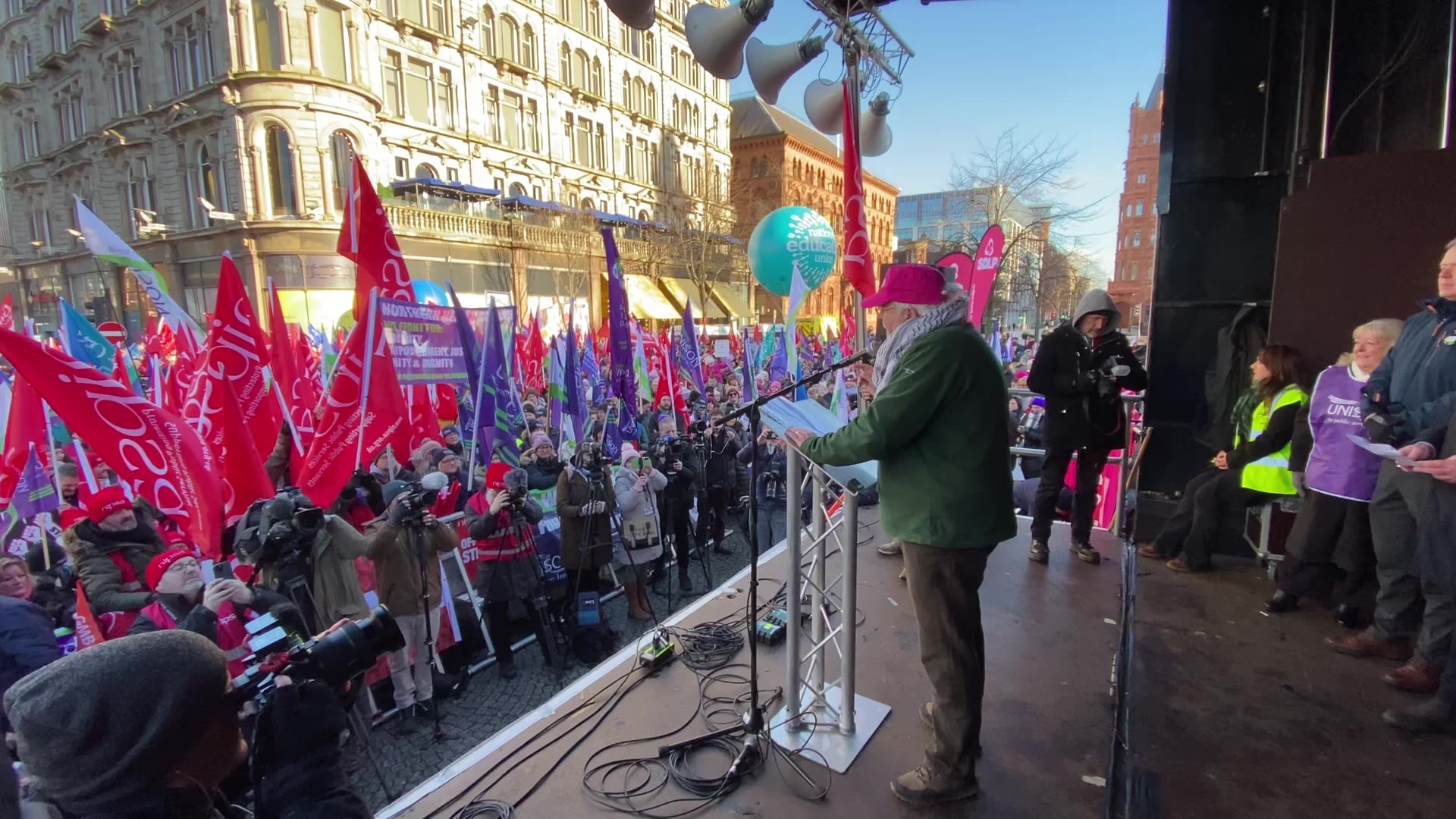
Cora explained that, in addition to a fair pay offer to help stabilise services in Northern Ireland, the SoR is hoping for development on the non-pay aspects of their employment.
This includes an increase in undergraduate numbers and education support within the workplace, an increase in apprenticeships and ‘learn as you earn’ programmes to be able to develop the assistant practitioner and support workforce.
“They [assistant practitioners] are a really rich resource but they’re undervalued,” Cora said. “They’re not developed, and they don’t have a firm career progression pathway. We have to develop that as well, because it will in turn allow our professional staff to advance into more advanced roles.”
These efforts are the only way to build a workforce that is sustainable, that wants to stay in Northern Ireland, and that is happy in the workplace, Cora said.
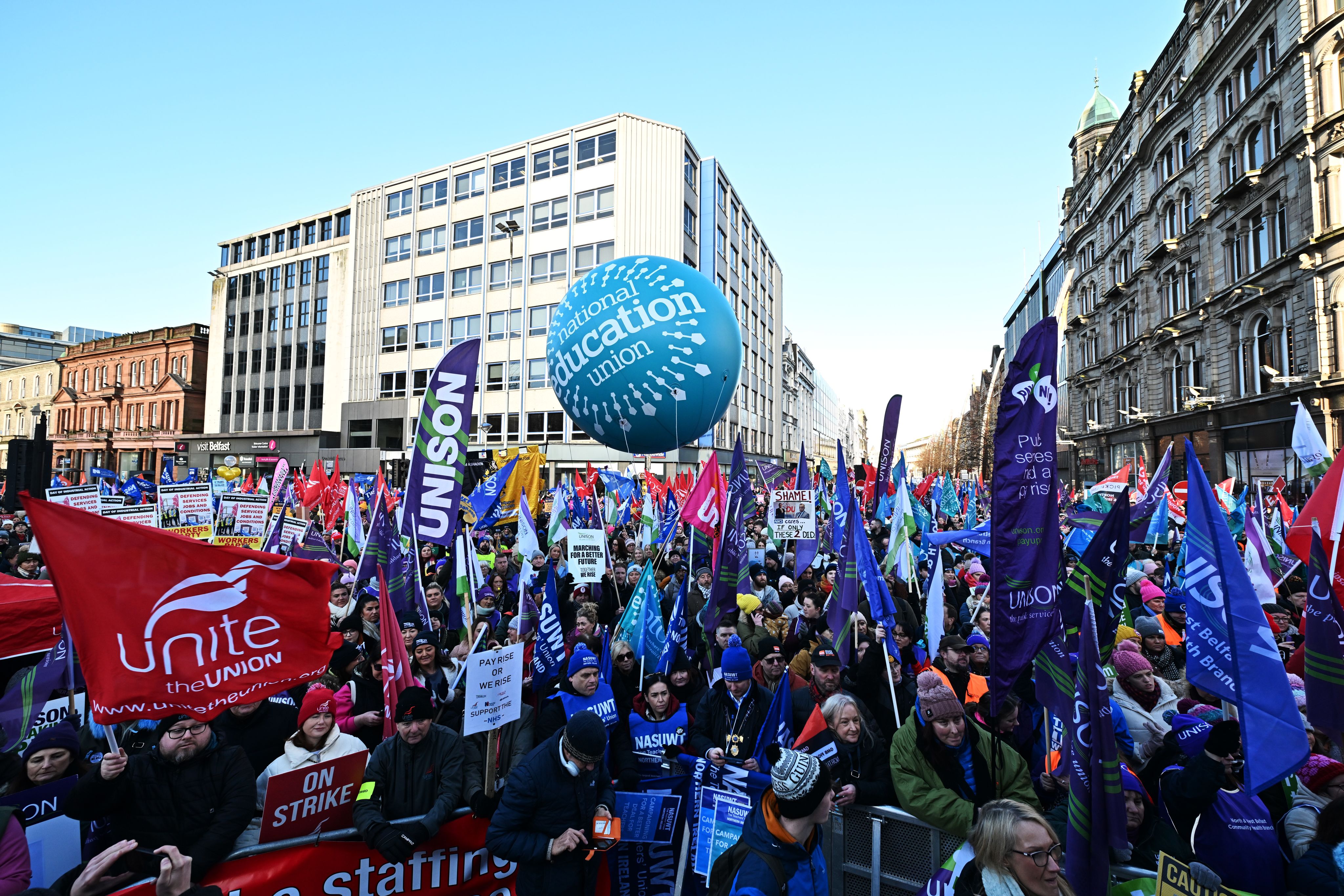
Political inertia
Cora added: “What’s brought us here is political inertia and ignorance of our political parties both here and in the Tory government overall. We need people to stand up to appreciate the work that our public sector workers do, and particularly the work that our diagnostic and therapeutic radiographers do across healthcare in Northern Ireland. We’re shouting with a loud voice today. Hopefully, we will be heard.”
Gill Hodges, 2019/20 president of the SoR and current council member for NI, said: “Staff are fed up. We’ve been used as a political club, as pawns. The money is there to pay us, but there’s a standoff between the UK government, and the DUP, and the rest of the political parties. Staff are facing an enormous economic crisis.
“All the unions are one big family together. We’re all out here for the same reason, to show just how fed up we are with what’s happening to workers in Northern Ireland. Everyone’s under so much pressure. Experienced staff are leaving, to find anywhere they can make more money, and the staff who are left have to pick up the slack.”
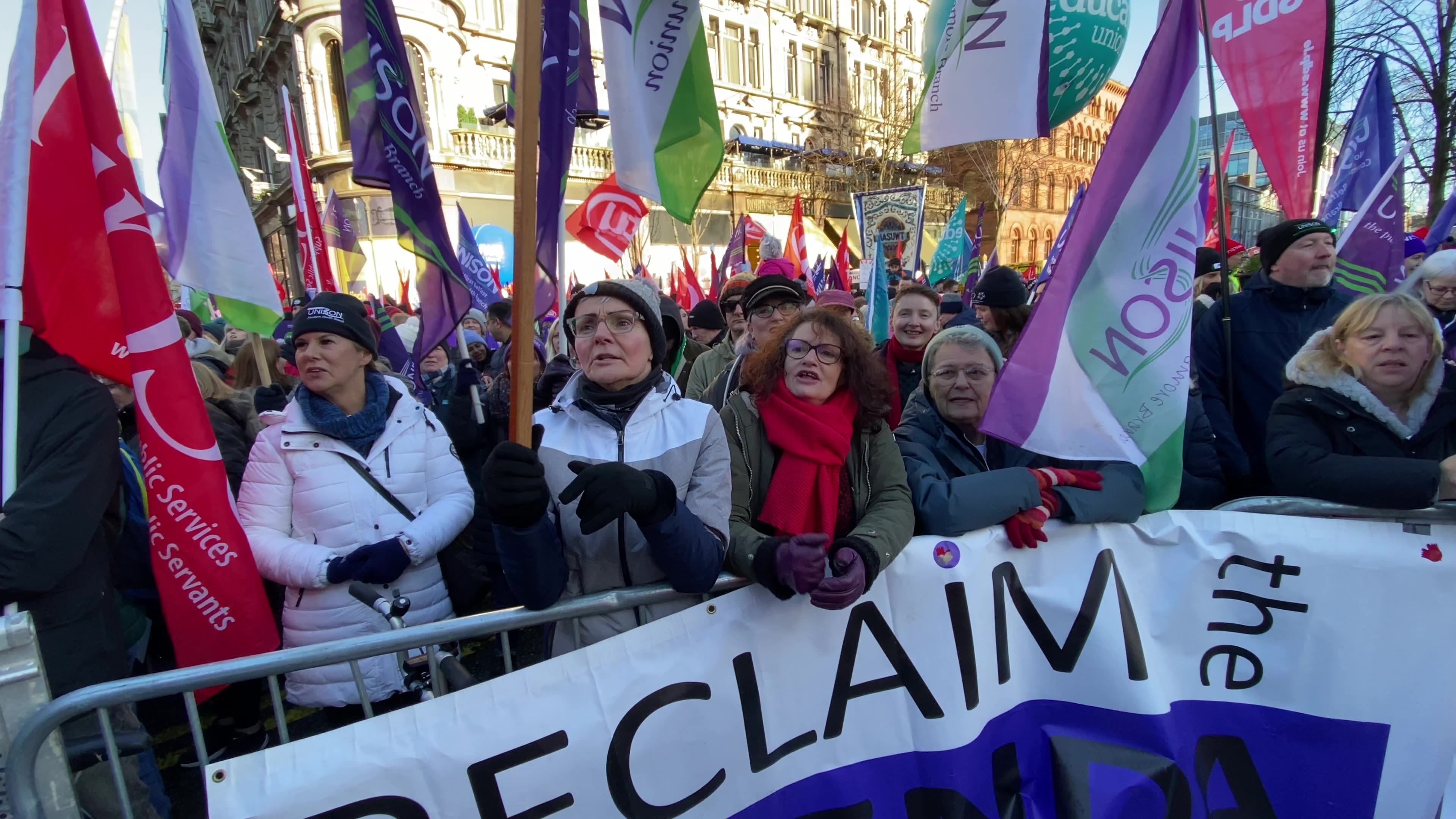
Voice of the unions
Once the strikers arrived at City Hall, speakers emerged onstage to express the importance of the strikes and invigorate the workers, accompanied by musical performances.
Union leaders told listeners this was a “turning point in history,”and that the workers of Northern Ireland must not go back to the “failing ways of the past.”
Union leaders addressed Chris Heaton-Harris, secretary of state for Northern Ireland, directly, urging the Conservative Westminster government to stop using public sector workers as a political tool.
The NIC-ICTU assistant general secretary, Gerry Murphy, said: “Today in the House of Commons, Chris Heaton-Harris repeated the same discredited line he has held throughout this crisis, that fair pay for public servants is not his responsibility, but that of a restored NI Executive.
“The Secretary of State’s strategy has clearly failed and it has failed the people of Northern Ireland.
“The trade union movement has won the popular argument, as witnessed by the support we have seen from women’s groups, the voluntary sector, students’ unions, the 50 chief executives in the public sector, the PSNI [Police Service of Northern Ireland] Chief Constable and the head of the NICS [Northern Ireland Civil Service] and the public at large.
“Each industrial dispute has been mandated by the votes of trade union members. Every stage of this campaign for fair pay and better budgets from accountable local political institutions, has had the input of small and large trade unions. We have worked with every political party to ensure that our message is clearly understood and our economic analysis is appreciated by all sides.
“It only remains for Chris Heaton-Harris to do the decent thing and release the funds.”
Unite regional secretary, Susan Fitzgerald, closed out the event, saying: “This all feels a bit like the Charles Dickens novel, A Tale of Two Cities. He opened that by saying, ‘It was the best of times, it was the worst of times. It was the season of light. It was the season of darkness. It was the spring of hope. And it was the winter of despair.’
“Locally and globally, we are living in unstable, difficult and dark times. But today's action can represent the spring of hope. The working class is the only progressive class in society, and it falls to us to defend public services and a society that preserves all its people. Solidarity, comrades.”
The full list of unions present for the strike included:
- Society of Radiographers (SoR)
- British Dietetic Association (BDA)
- Chartered Society of Physiotherapists (CSP)
- GMB
- Irish National Teachers' Organisation (INTO)
- Siptu
- National Association of Headteachers (NAHT)
- National Association of Schoolteachers and Union of Women Teachers (NASUWT)
- National Education Union (NEU)
- Nipsa
- Royal College of Midwives (RCM)
- Royal College of Nursing (RCN)
- Ulster Teachers Union (UTU)
- Unison
- Unite
- University and College Union (UCU)
Find out more...
The Society of Radiographers is both a professional body and a trade union.
The Society of Radiographers philosophy is always to ensure that at the heart of any trade union argument is a member’s professional responsibility to provide a high standard of care to the patient. It is important to acknowledge that most trade union issues are inextricably linked to professional ones and consequently working together strengthens how we can support members.
Find out more about SoR's trade union work here.
Image credits: Charles McQuillan/Getty Images Editorial Footage/ Getty Images
Now read...


